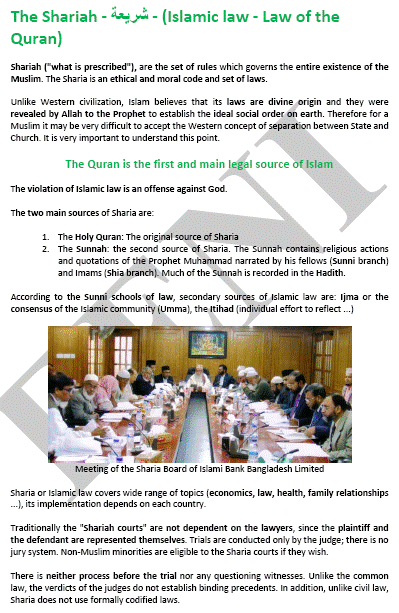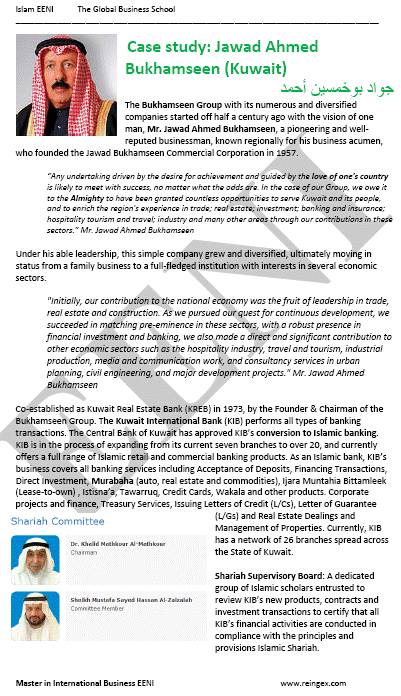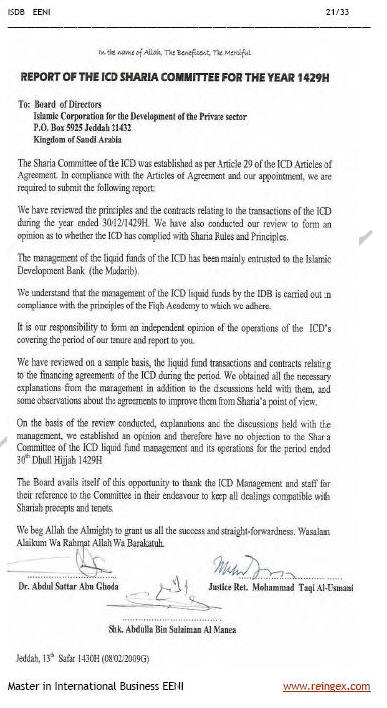Sharia (Islamic Law)

Sharia (Islamic Law or Law of the Quran)
- Introduction to the Sharia (Islamic Law)
- The Holy Quran and Sunnah as the sources of the Sharia
- Sharia as Ethical and Moral code
- Implications of the Application of the Sharia on the Islamic societies
- Sharia and Business
- Application of the Sharia by country

The Subject “Sharia: Islamic Law” belongs to the following Online Programs taught by EENI Global Business School:

Masters: International Business, Foreign Trade, Religions & Business.
Doctorate: Ethics, Religion & Business, Islamic Business.
Languages:  or
or  Sharia
Sharia  Sharia
Sharia  Sharia.
Sharia.
The Five pillars of Islam - Fiqh (Islamic Jurisprudence) - Human Rights in Islam.
Sample - Sharia - Islamic Law (Islamic Civilization)

Sharia (Islamic Law).
The Sharia (“what is prescribed”), is a set of rules that govern the entire existence of a Muslim .
- The Sharia is an ethical and moral code and a set of laws
- Quran is the first and main legal source of Islam
- The violation of the Islamic Law is an offence against God
- Unlike Western Civilization, Islam believes that its laws are of divine origin, and they were revealed by Allah to the Prophet to establish the ideal social order on earth
Therefore, for a Muslim, it may be tough to accept the Western concept of separation between State and Church. It is crucial to understand this point.
The two main sources of the Sharia are:
- Holy Quran: The source of the Sharia
- Sunnah: The second source of the Sharia.
- The Sunnah contains the religious actions and quotations of the Prophet Muhammad narrated by his fellows (Sunni branch) and Imams (Shi'a branch)
- Much of the Sunnah is recorded in the Hadith
According to the Sunni School of law, the secondary sources of the Islamic law are Ijma or the consensus of the Islamic Community (Ummah) and Itihad (an individual effort to reflect).
The Sharia, or Islamic Law, covers a broad range of topics (Economics, Banking, law, health, or family relationships), its implementation depends on each country.
Traditionally the “Sharia Courts” are not dependent on lawyers since the plaintiff, the defendant has represented themselves.
- Trials are conducted only by the judge; there is no jury system
- Non-Muslim minorities are eligible to the Sharia courts if they wish
- There is neither process before the trial nor any questioning witnesses
- The verdicts of the judges do not establish binding precedents
- Instead of written evidence, the oath has much more importance, instead of being used simply to guarantee truth of testimony, are used as evidence
- Having the testimony of a witness is more importance than a written proof; it is evident that a contract has much less importance than a verbal agreement. This is an issue that we should never forget when doing business in countries that wholly or partially implemented Sharia Law
In the history of Islam, the Sharia has always coexisted with other legal systems. Today, few Muslim Countries apply strictly and comprehensively the whole code of the Sharia; many only apply some aspects of the Sharia.
In principle, in all those countries where the Sharia is applied, total or partially, shall apply only to the Muslims; other religions should have a different law.
For business, the Sharia should not affect an exporter directly in Foreign Trade operations. However, the Sharia can affect the pricing policy, product, or promotion. It may also affect when opening a branch or hiring local Muslim workers.
Sulaiman Al-Rajhi created the Al-Rajhi Bank one of the largest Islamic banks, offering products and services according to the Sharia principles.
The International Bank of Kuwait (Bukhamseen Group) is an excellent example of the Sharia Supervisory Board.

Arab Trade Financing Programme (ATFP).
An example of the Sharia Report of the Islamic Development Bank.

(c) EENI Global Business School (1995-2024)
We do not use cookies
Top of this page



